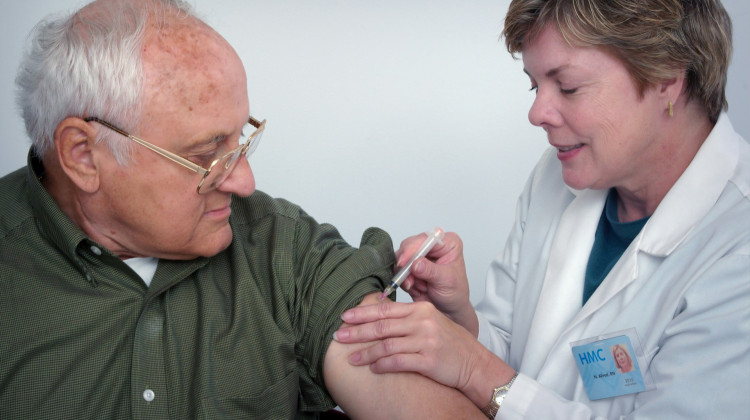
Hundreds of people marched around the IUPUI medical campus in Indianapolis on June 29 in support of abortion rights.
Darian Benson/WFYIThe past week has been “one of the most terrifying weeks” the medical community has gone through, according to one Indianapolis physician.
Dr. Tracey Wilkinson is an assistant professor of pediatrics at Indiana University School of Medicine – and a colleague of Dr. Caitlin Bernard, an Indiana OB-GYN who has been caught in a national political debate.
Bernard became the subject of attention and public attacks after she spoke with the media about an abortion she recently provided to a 10-year-old who reported a rape in Ohio. Indiana Attorney General Todd Rokita took to Fox News to accuse Bernard, without evidence, of a history of non-compliance with state law.
Documents from Indiana health officials showed Bernard was compliant in reporting the case to state health agencies. And her employer, IU Health, said an investigation found Bernard was compliant with patient privacy laws. Her lawyers also sent a cease and desist letter to Rokita, who said in a statement Friday that his office’s legal review of Bernard’s case remains open.
“We have been watching one of our colleagues, Dr. Bernard, vilified, threatened on national television, with multiple attorney generals threatening to investigate her,” Wilkinson said. “Watching this happen to a colleague and being concerned for whether this could happen to one of us next has been what has been incredibly terrifying.”
Wilkinson points to a 2021 Indiana law that requires physicians, hospitals and clinics to file a report with the state if a patient who previously had an abortion is diagnosed with certain health conditions, including cardiac arrest, allergic reactions to anesthesia and depression.
The lawmakers who spearheaded the measure said it aims to protect public health by tracking potential complications from abortion procedures.
Wilkinson said in an email that laws like this single out abortion “in a way that no other medical procedure or diagnosis is legislated.”
These laws “don’t protect patients,” she said. And if Indiana ultimately moves to ban abortion, doctors will still have to report patients’ prior abortions to the state, which Wilkinson worries could put patients at risk of criminalization.
The law affects all hospitals, clinics and physicians — not just those who provide abortion services. And the way it’s written is confusing to providers, she said.
Wilkinson wrote about her concerns about laws being passed by politicians without medical expertise in an opinion piece for the New York Times.
“Lawmakers can claim that the laws aren’t intended to hurt patients, but they instill fear in providers that will have implications for patients nonetheless,” Wilkinson wrote. “The law is written so broadly that a primary care provider who sees a patient with depression, an anesthesiologist whose patient has an allergic reaction to a medication or a radiologist who notes a patient has free fluid in the abdomen could be punished with a fine and jail time if they don’t report these things as possible complications of that person’s prior abortion.”
Wilkinson told WFYI she worries that she could be providing “compassionate, evidence-based health care” to patients and still end up the next target of public attacks.
“And that is not why I went to medical school,” Wilkinson said. “I went to medical school to take care of patients.”
Since the Supreme Court’s ruling to overturn Roe v. Wade, states are quickly implementing their own laws surrounding abortion and reproductive rights.
“I joke that I wish I had gone to law school as part of my medical school training to learn how to read and interpret some of these languages that are coming out,” Wilkinson said.
Abortion is still legal in Indiana. But abortion services providers across the state say they are preparing for the worst, as the Indiana General Assembly is expected to include an abortion ban during the special session, which is scheduled for July 25.
It’s unclear at this point what that ban will include or if it will make exceptions for incest, rape or when the life of the pregnant person is at risk.
Contact reporter Darian Benson at dbenson@wfyi.org. Follow on Twitter: @helloimdarian.
 DONATE
DONATE







 Support WFYI. We can't do it without you.
Support WFYI. We can't do it without you.